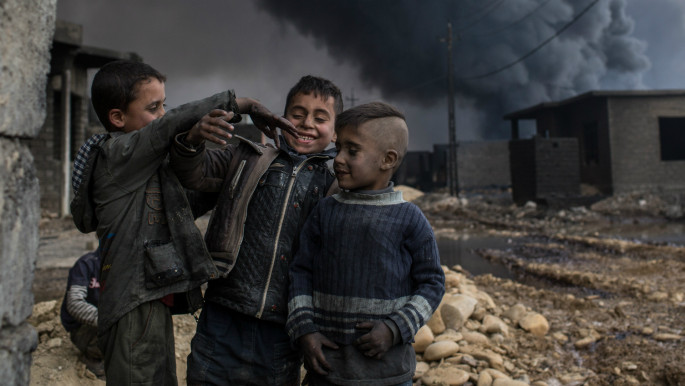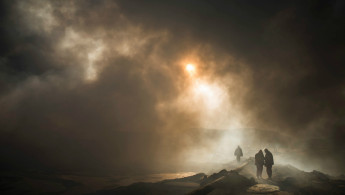Suffering as IS scorches the air in its wake
It sounds like a scene of calm daily life in a city that regained by the Iraqi army three months ago.
But looking at them closely, children have their hands and feet blackened, their faces smeared with soot.
They are breathing smoke and sulfur as they play football in the face of oil wells burned by Islamic State [IS] group militants three months ago.
The oil wells are still burning.
In early summer IS, in an attempt to slow Iraqi army advance, burned the city's oil wells [at least a dozen according to the UN] and in September and October they launched at least three chemical attack, setting fire at chemical plant Mishraq, south of Mosul.
They left behind them two years of terror and violence and an environmental disaster that is creating health damage to the whole population.
 |
| Children have their hands and feet blackened and their faces smeared with soot [AFP] |
Zyad works at shutdown of the oil wells, he says: "Today in Qayyara everything is lacking, in the hospital even oxygen to treat those who have respiratory difficulties is lacking.
"The air is completely contaminated. The elderly and children arrive at the hospital with wet sheets in the face, they cannot breathe and we have not even medicine enough.
"Not only that, people continue to eat vegetables grown in this area, the few who survived the fire, the smoke, the sulfur, this means that those who do not get sick now, will get sick in the coming months."
In a report published on November 11, Human Rights Watch [HRW] tells about wounds found in at least seven persons compatible with exposure to low levels of a chemical "blister" agent.
Lama Fakih, HRW Deputy Director for the Middle East, says: "IS attacks using toxic chemicals show a brutal disregard for human life and the laws of war. As [IS] fighters flee, they have been repeatedly attacking and endangering the civilians they left behind, increasing concerns for residents of Mosul and other contested areas."
Children's eyes express two years of terror, now they live in slow, empty days spent watching the high flames in front of their homes.
 |
Children's eyes express two years of terror, now they live in slow, empty days spent watching the high flames in front of their homes |  |
Makhmoud worked for the Iraqi army before 2014, he is about 30 years old. He walks in front of the flames shaking his head, as he calls around him all the children and asks "How long haven’t you been to school?"
"Two years," the children say.
"Two years without school!" Makhmoud says, "This is the most significant damage left by [IS]. More than the flames - that sooner or later we will blow out - more than respiratory problems, because we will all have to die.
"The lack of education is the most dangerous damage. Around here they organised training camps. Young boy arrived from Syria and from Turkey.
They also wanted to drag our children in training camps to teach them to kill. With some they succeeded. Those children are lost, forever. "
Makhmoud has a cigarette in his left hand, he rotates it with two fingers nervously, then he shows it proudly.
"The first time I was surprised while smoking, they made me a fine of 300,000 dinars, they told me it was just a warning, and the next time they would cut my head. The same people who forbade us to smoke burned our main wealth, oil."
Makhmoud remembers public executions, officials hanged on a bridge for three days: a warning to the whole population.
He reminds people flogged in the market place, the shops forced to pay taxes to IS and those forced to shut down.
He remembers all his acquaintances who supported IS "because they thought it would guarantee them a decent life, but decent life never arrived and now we risk to lose a generation of children if we don't free them, patiently, by the corrupt information they received in Islamic school under IS, about life, about death and about religion.”
Now in Qayyara the schools are closed, the houses are covered with smoke.
 |
| Looking at Qayyara from a distance, it is like the apocalypse [AFP] |
Looking at Qayyara from a distance, it is like the apocalypse. It seems like Kuwait during the Gulf War - as if a pirouette of history.
At that time the former dictator Saddam Hussein used the same strategy before retreating - set fire to the oil wells to oppose the advance of the allied forces.
It was in 1991, when over 700 oil wells were set on fire. It took over a year to stop the fire.
Qayyara, a predominantly Sunni city rich in wells, is now experiencing a similar fate. And under the sky blackened by oil, the destruction is more evident.
The two main oil fields in Qayyara region, Qayyara and Najma, before being conquered by IS militants in 2014, produced up to 30,000 barrels of oil per day and, according experts, the militant group would have continued to exploit the oil, sending up to 50 tanker trucks a day to Syria.
"As long as they have been sure to control the city, they exploited all our oil," Makhmoud says.
"They sold it on the black market. Today we have nothing, no house, no job, nor the wealth of the country, oil."
Teenagers gathered around the wreckage of a car, proudly watching a video on the phone of one of them.
There is the corpse of an IS member. A man gives a knife to a boy and orders him to behead him. The body is naked and then tied to a car, dragged through the streets of Qayyara among the jubilant cries of the people. Among the jubilant shouts of children.
The liberation of Mosul and surrounding villages risk becoming a form of brutalisation of the enemy.
The same children playing football in front of the flames, trying to regain their denied innocence; the same children who need the purity of their childhood, are encouraged by adults to lash out ferociously on the body of the enemy.
On adults, this liberation means also dilation and revenge.
IS's defeat in Mosul is already written, but their resistance will be hard, long and bloody.
Meanwhile in Iraq, the winners - now allies – are preparing the wars of tomorrow.



